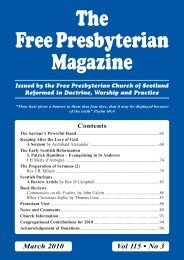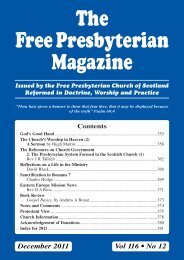May - the Free Presbyterian church of Scotland
May - the Free Presbyterian church of Scotland
May - the Free Presbyterian church of Scotland
You also want an ePaper? Increase the reach of your titles
YUMPU automatically turns print PDFs into web optimized ePapers that Google loves.
Scottish Reformers’ View <strong>of</strong> Romanism 143<br />
<strong>the</strong>ir baptism. (3) That no man is without sin as long as he lives. (4) That<br />
good works make not a good man, but that a good man doeth good works,<br />
and that an ill man doeth ill works; yet <strong>the</strong> same ill works truly repented <strong>of</strong><br />
make not an ill man. (5) That a man is not justified by works but by faith<br />
only. (9) That it is a devilish doctrine to teach that, by any actual penance,<br />
remission <strong>of</strong> sins is purchased. (10) That auricular confession is not essential<br />
to salvation. (11) That <strong>the</strong>re is no purgatory. (13) That <strong>the</strong> Pope is Antichrist,<br />
and that every priest hath as much power as <strong>the</strong> Pope.”<br />
These articles are more doctrinal, and more closely related to <strong>the</strong> way <strong>of</strong><br />
salvation, than those against <strong>the</strong> Lollards <strong>of</strong> Kyle. To <strong>the</strong>se articles, Hamilton<br />
replied that “he held <strong>the</strong> first seven to be undoubtedly true; <strong>the</strong> rest were disputable<br />
points, but such as he could not condemn, unless he saw better reasons<br />
than yet he had heard.” This reply is puzzling. One would have expected him<br />
to accept articles 9-11 above as undoubtedly true. Article 9 relates to <strong>the</strong><br />
atonement, and whe<strong>the</strong>r human works add anything to it. Article 10 touches<br />
on <strong>the</strong> place <strong>of</strong> <strong>the</strong> Church in salvation (perhaps a statement like, “He that<br />
believeth and is baptized shall be saved” (Mk 16:16), was confusing him).<br />
But <strong>the</strong>re is some uncertainty over <strong>the</strong> articles – John Foxe’s Acts and<br />
Monuments gives a ra<strong>the</strong>r different list and significantly alters article 9 (“It<br />
is a devilish doctrine to enjoin any sinner actual penance, for sin”) – so we<br />
cannot make too much <strong>of</strong> this point. Foxe’s list contains several articles on<br />
<strong>the</strong> Pope’s spiritual and temporal authority which Spottiswoode omitted.<br />
Like <strong>the</strong> Lollards before him, Hamilton was strongly inclined to identify <strong>the</strong><br />
Papacy with <strong>the</strong> Antichrist: at <strong>the</strong> very least he regarded <strong>the</strong> Pope as exceedingly<br />
wicked. It is interesting to note his essentially <strong>Presbyterian</strong> doctrine<br />
in article 13: that all priests (ministers) are equal. In Foxe’s list, it was also<br />
charged against Hamilton that he maintained that “Master Patrick Hamilton<br />
was a bishop” – one can see why <strong>the</strong> Episcopalian Spottiswoode might have<br />
omitted this article.<br />
One o<strong>the</strong>r source <strong>of</strong> information about Hamilton is Archbishop Beaton’s<br />
“Citation” against him in 1527. This mentions some <strong>of</strong> <strong>the</strong> usual Romish<br />
beliefs and practices which Hamilton rejected – worshipping <strong>of</strong> images, salvation<br />
through good works, prayers for <strong>the</strong> dead – and also charges him with<br />
teaching that “<strong>the</strong> sacraments <strong>of</strong> <strong>the</strong> Church were not to be believed” and “that<br />
those who trusted in <strong>the</strong>m had died in an evil and wicked belief and been<br />
buried in hell”. This was a repudiation <strong>of</strong> <strong>the</strong> sacrifice <strong>of</strong> <strong>the</strong> mass, and possibly<br />
also <strong>of</strong> transubstantiation, which was not o<strong>the</strong>rwise mentioned. He was<br />
also allegedly teaching that “<strong>church</strong>es are not to be frequented”. If this charge<br />
was correct, <strong>the</strong>n already <strong>the</strong> idea <strong>of</strong> separation from <strong>the</strong> Church <strong>of</strong> Rome<br />
was receiving prominence.

















